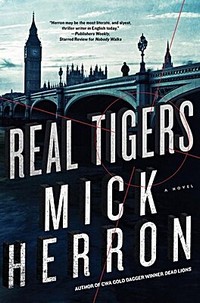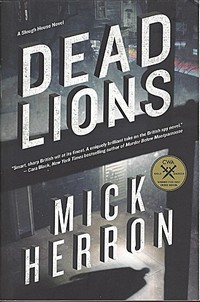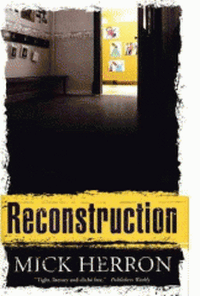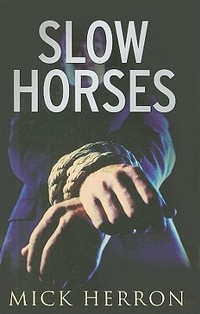 Spook Street
Spook Street
by Mick Herron
DETAILS: Series: Slough House, #4 Publisher: Soho Crime Publication Date: December 12, 2017 Format: Paperback Length: 307 pg. Read Date: October 18-29, 2024

“You want me to issue a shoot-to-kill order.”
“Well there’s no point shooting to wound. People would only get hurt.”
What’s the Back Cover of Spook Street Say?
What happens when an old spook loses his mind? Does the Service have a retirement home for those who know too many secrets but don’t remember they’re secret? Or does someone take care of the senile spy for good? These are the paranoid concerns of David Cartwright, a Cold War-era operative and one-time head of MI5 who is sliding into dementia, and questions his grandson, River, must figure out answers to now that the spy who raised him has started to forget to wear pants.
But River, himself an agent at Slough House, MI5’s outpost for disgraced spies, has other things to worry about. A bomb has detonated in the middle of a busy shopping center and killed forty innocent civilians. The “slow horses” of Slough House must figure out who is behind this act of terror before the situation escalates.
Things I’m Not Going to Develop into Paragraphs:
(I just don’t have the time or energy)
 Louisa makes a friend! A non-Slough House friend, it should be stressed. Which is great—and will hopefully help her deal with the events of Dead Lions. Sure, I pretty much like everything about Louisa, but this worked really well.
Louisa makes a friend! A non-Slough House friend, it should be stressed. Which is great—and will hopefully help her deal with the events of Dead Lions. Sure, I pretty much like everything about Louisa, but this worked really well.
 This: “What happens when an old spook loses his mind? Does the Service have a retirement home for those who know too many secrets but don’t remember they’re secret?” Yeah, it could be phrased a bit more skillfully, but really—what is done in these situations (I have to assume more and more of these happen all the time)
This: “What happens when an old spook loses his mind? Does the Service have a retirement home for those who know too many secrets but don’t remember they’re secret?” Yeah, it could be phrased a bit more skillfully, but really—what is done in these situations (I have to assume more and more of these happen all the time)
 This book is really all about the power behind the throne. Sure, all the attention is on the leader (of whatever), but being the guy behind them—almost all of the power, but with almost none of the accountability or scrutiny, you can get a lot done. And you can direct the person at the top with just the right kind of pressure or incentive.
This book is really all about the power behind the throne. Sure, all the attention is on the leader (of whatever), but being the guy behind them—almost all of the power, but with almost none of the accountability or scrutiny, you can get a lot done. And you can direct the person at the top with just the right kind of pressure or incentive.
 Yes, the “Slow Horses” are, by design (of both Herron and MI-5) disposable, and impermanent. But some are pretty much irreplaceable, as the poor woman who is brought in to fill Catherine Standish’s shoes learns.
Yes, the “Slow Horses” are, by design (of both Herron and MI-5) disposable, and impermanent. But some are pretty much irreplaceable, as the poor woman who is brought in to fill Catherine Standish’s shoes learns.
 Everything we learned about David Cartwright and his activities seems realistic. It’s chilling and troubling in so many ways. He deserves to be called OB. Or just B.
Everything we learned about David Cartwright and his activities seems realistic. It’s chilling and troubling in so many ways. He deserves to be called OB. Or just B.
 Back to the impermanent idea. Herron shows us that he’s in the same league as authors like George R.R. Martin when it comes to the mortality of characters. I both admire that and am angered by it.
Back to the impermanent idea. Herron shows us that he’s in the same league as authors like George R.R. Martin when it comes to the mortality of characters. I both admire that and am angered by it.
 Roderick Ho…what can I say about him? At the beginning of the book, I couldn’t believe what I was reading about him—it was far more hard to believe than any of the outlandish things we’ve seen Jackson Lamb’s team encounter. By the end, it all made sense. And I might have felt pity for the guy (although he makes it hard)
Roderick Ho…what can I say about him? At the beginning of the book, I couldn’t believe what I was reading about him—it was far more hard to believe than any of the outlandish things we’ve seen Jackson Lamb’s team encounter. By the end, it all made sense. And I might have felt pity for the guy (although he makes it hard)
 Herron’s prose is so delicious. It’s mirthful without actually being funny (and only occasionally jokey). It’s so well crafted, it’s…I can’t put it into words. I just love reading him.
Herron’s prose is so delicious. It’s mirthful without actually being funny (and only occasionally jokey). It’s so well crafted, it’s…I can’t put it into words. I just love reading him.
They were south of the river, half a mile from the Thames, near one of those busy junctions which rely on the self-preservation instincts of the drivers using it; ether a shining example of new-age civic theory, or an old-fashioned failure of town planning. On one of its corners sat a church; on another, earth-moving monsters re-enacted the Battle of the Bulge behind hoardings which shivered with each impact. A tube station squatted on a third, its familiar brick-and-tile facade more than usually grubby in the drizzle. There was a lot of construction work nearby, buildings wrapped in plastic sheeting, some of it gaudily muralled with visions of a bright new future: the gleaming glass, the pristine paving, the straight white lines of premises yet-to-be. Meanwhile, the surviving shops were the usual array of bookmakers, convenience stores and coffee bars, many of them crouching behind scaffolding, and some of them book-ending alleyways which would be either dead-ends where wheelie-bins congregated, or short-cuts to the labyrinth of darker streets beyond. Once upon a time Charles Dickens wandered this area, doubtless taking notes. Nowadays the local citizenry’s stories were recorded by closed-circuit TV, which had less time for sentimental endings.
So, what did I think about Spook Street?
Once again, I couldn’t stop asking myself why I am so behind in reading these? Why do I take breaks of months and months between them? Everything about this series is great.
I’m just happy the whole time I’m reading one of these books—despite the fact that the events are harrowing, the characters are generally despicable, and what the books suggest about humanity and Western security services (UK’s in particular, but I can only imagine they function pretty similarly to the rest) doesn’t fill one with optimism or confidence.
Spook Street is a solid winner from the horrible incident the book started with to the closing comforting paragraphs and all points in between. Herron planted more seeds than is typical for future installments—and I can’t decide which I want to see first (on second thought, I want to see the Roddy Ho stuff come back to haunt him/Slough House as soon as is humanly possible).
If you’re not reading these books—at my snail-like pace or at a rational pace—you are missing out.

This post contains an affiliate link. If you purchase from it, I will get a small commission at no additional cost to you. As always, the opinions expressed are my own.
![]()













